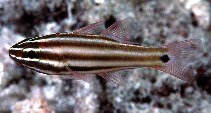| Family: |
Apogonidae (Cardinalfishes), subfamily: Apogoninae |
| Max. size: |
11 cm TL (male/unsexed) |
| Environment: |
reef-associated; marine; depth range 6 - 65 m |
| Distribution: |
Indo-Pacific: Red Sea and East Africa (Ref. 2334) to the Line and Mangaréva islands, north to Japan, south to New Caledonia. |
| Diagnosis: |
Dorsal spines (total): 8-8; Dorsal soft rays (total): 9-9; Anal spines: 2-2; Anal soft rays: 8-8. Whitish with 5 horizontal stripes (brassy to dark brown in color); dark spot at base of middle caudal fin rays; fin rays light red (Ref. 2334). Greatest depth of body 2.7-3.2 in SL (Ref. 90102). Dorsal-fin rays VII-I, 9; anal-fin rays II, 8; pectoral fin rays 14; pelvic fin rays I, 5; pored lateral line scales 24; predorsal scales 4; circumpeduncular scales 12; total gill rakers 19, developed gill rakers 14; body white colored, with five poorly defined dark brown stripes on lateral surface of body, posterior end of third stripe reaching black spot on base of caudal fin; base of caudal fin with spot subequal in size to pupil (Ref. 93839). |
| Biology: |
Commonly found in clear-waters of seaward reefs; on reef crests and slopes, where usually shallow, and along deep drop-offs to 25 m (Ref. 48635). Feeds on polychaetes and other small benthic invertebrates at night; cryptic under ledges or in holes by day (Ref. 1602). Solitary or in small groups (Ref 90102). |
| IUCN Red List Status: |
Least Concern (LC); Date assessed: 05 February 2021 Ref. (130435)
|
| Threat to humans: |
harmless |
Source and more info: www.fishbase.org. For personal, classroom, and other internal use only. Not for publication.
